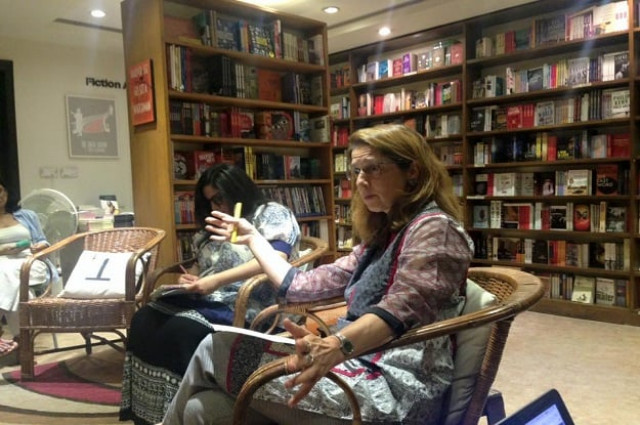Online misogyny discussed, analysed
Speaker says attackers attempt to demean and silence women

Speaker says attackers attempt to demean and silence women. PHOTO: fb.com/TheLastWordbks
Last week, in a video that went viral on social media, analyst Faisal Qureshi employed misogynist references to assail Bollywood actor Saif Ali Khan for his comments on Pakistan banning the screening of his flick Phantom. A few days later, a motivational speaker used a derogatory word for a Pakistani actress who had defended the movie on Twitter and a Pakistani actor initiated the campaign #BanMawra.
It is in the backdrop of these incidents that The Last Word and the Digital Rights Foundation organised a talk on Saturday titled Call To Action: Online Misogyny in Pakistan and How to Combat It. The discussion featured Nabiha Mehr Sheikh of the Pakistan Feminist Watch, Susan Benesch of The Berkman Centre for Internet and Society at Harvard University, Nighat Dad of Digital Rights Foundation and Jahanzaib Haque of Dawn.com.
Read: Smashing misogyny and misandry in one sweep
Sheikh opened the discussion with an explanation of how recent events had unleashed a flood of vitriol on the internet. In the #BanMawra campaign, for example, a lot of the insults were hurled at the woman’s body which was being used as an analogy to national honour, she said. The woman’s body had become a site to abuse, a tool to denigrate someone and a way of mocking the enemy, in this case, India, she said.

“The world online is something of a sewer…there are threats, abuse and all sorts of harm,” Benesch said. She discussed three categories of attacks directed at women on the internet – personal attacks, campaigns to demean women, and reflexive misogyny.
Personal attacks include instances where a woman is victimised because she expresses herself online in a manner that is considered transgressive or invasive in the perception of those who decide to target her. Benesch cited the example of the Gamergate Controversy in the United States which concerned sexism in videogames. The controversy was most noted for a harassment campaign which had attempted to drive away feminists from the video game industry. The harassment included threats of rape, shooting at a university speaking event and even doxing – publishing someone’s personal information, which includes their home address, the names of schools their children attend and the time they leave for school in the morning. “It can be very vicious and terrifying,” she said.
Read: Junaid Jamshed's sexist remark causes outrage on social media
Benesch explained the second category as attacks against women as a group. By terming women feminazis and so on, the attackers attempt to express their rage, and to demean and silence women. Reflexive misogyny, she said, included incidents in which people expressed themselves in a misogynistic way without the intent of being misogynist.
There have been several successful counter-campaigns, Benesch said. A few years ago, the Turkish deputy prime minister gave a speech regarding the proper comportment of women. This had sparked a twitter campaign #kahkaha in which there was an explosion of selfies on Twitter showing women laughing in public. As the campaign went viral, the deputy prime minister was forced to retract his statement. “The campaign was interesting because it employed humour and no words to send a powerful message,” she said.
Haque spoke about an online campaign against Dawn, launched on Saturday in response to a story carried that day. Those behind the campaign had used images of the group chairman to demean the media house. He said he had reported some of the images to Twitter right away and most of them had disappeared from the website. Haque explained that it was not outside the realm of possibility that Twitter would respond to such attacks. It’s much more effective if people report and flag such content in groups, he said.
“It is futile to engage with attackers and explain your position to them,” he said. “What I find more useful is to approach media groups. Media is powerful and can stand up to hordes,” Haque said.
Published in The Express Tribune, September 7th, 2015.



















COMMENTS
Comments are moderated and generally will be posted if they are on-topic and not abusive.
For more information, please see our Comments FAQ